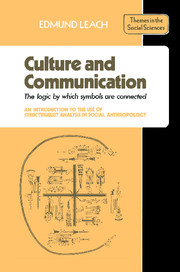 Culture and Communication
Culture and Communication Book contents
- Frontmatter
- Contents
- Culture and communication: the logic by which symbols are connected
- Introduction
- 1 Empiricists and rationalists: economic transactions and acts of communication
- 2 Problems of terminology
- 3 Objects, sense-images, concepts
- 4 Signals and indices
- 5 Transformations
- 6 Theories of magic and sorcery
- 7 The symbolic ordering of a man-made world: boundaries of social space and time
- 8 The material representation of abstract ideas: ritual condensation
- 9 Orchestral performance as a metaphor for ritual sequence
- 10 The physiological basis of sign/symbol sets
- 11 Mapping: time and space as reciprocal representations
- 12 Rank order and orientation
- 13 Examples of binary coding
- 14 Mating prescriptions and proscriptions
- 15 Logic and mytho-logic
- 16 Basic cosmology
- 17 Rites of transition (rites de passage)
- 18 The logic of sacrifice
- 19 Conclusion
- Bibliography
- Index
1 - Empiricists and rationalists: economic transactions and acts of communication
Published online by Cambridge University Press: 05 June 2012
- Frontmatter
- Contents
- Culture and communication: the logic by which symbols are connected
- Introduction
- 1 Empiricists and rationalists: economic transactions and acts of communication
- 2 Problems of terminology
- 3 Objects, sense-images, concepts
- 4 Signals and indices
- 5 Transformations
- 6 Theories of magic and sorcery
- 7 The symbolic ordering of a man-made world: boundaries of social space and time
- 8 The material representation of abstract ideas: ritual condensation
- 9 Orchestral performance as a metaphor for ritual sequence
- 10 The physiological basis of sign/symbol sets
- 11 Mapping: time and space as reciprocal representations
- 12 Rank order and orientation
- 13 Examples of binary coding
- 14 Mating prescriptions and proscriptions
- 15 Logic and mytho-logic
- 16 Basic cosmology
- 17 Rites of transition (rites de passage)
- 18 The logic of sacrifice
- 19 Conclusion
- Bibliography
- Index
Summary
In this section I shall delimit my field.
As you can see from its title, the essay which I have listed in the bibliography under Mary Douglas (1972) bears directly on my theme. In comment on a famous paper concerning the seasonal life of the Eskimo published at the beginning of the century (Mauss and Beuchat (1906)) Douglas writes as follows:
‘[It] is an explicit attack on geographical or technological determinism in interpreting domestic organization. It demands an ecological approach in which the structure of ideas and of society, the mode of gaining a livelihood and the domestic architecture are interpreted as a single interacting whole in which no one element can be said to determine the other.’
Thus described, the Eskimo paper may be considered a prototype for what every British social anthropologist would like to do with the ethnographic data which fill his notebooks. In practice the monographs which anthropologists write seldom preserve this kind of balance. According to the predilections of the author we find that special stress is laid either on the structure of ideas, or on the structure of society, or on the mode of gaining a livelihood, and the principle that we are all the time dealing with ‘a single interacting whole’ is easily forgotten.
It is also easy to forget that contrasted predilections of individual authors are themselves part of a single interacting whole.
All social anthropologists take as their subject matter the variety of human culture and society, and they all assume that their task is not only to describe what the varieties are but to explain why they exist.
- Type
- Chapter
- Information
- Culture and CommunicationThe Logic by which Symbols Are Connected. An Introduction to the Use of Structuralist Analysis in Social Anthropology, pp. 3 - 8Publisher: Cambridge University PressPrint publication year: 1976


